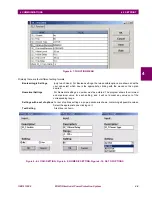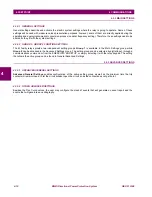
3-14
MIWII Directional Power Protection System
GEK-113308
3.2 WIRING
3 HARDWARE
3
3.2.8 RS485 COMMUNICATIONS PORT
In addition to the front RS232 port, the relay provides the user with an additional RS485 communication port. RS485 data
transmission and reception are accomplished over a single twisted pair that transmit and receive data alternating over the
same two wires. Through the use of these port, continuous monitoring and control from a remote computer, SCADA
system or PLC is possible.
To minimize errors from noise, the use of shielded twisted pair wire is recommended. For a correct operation, polarity
must be respected, although if it is not, there is no danger to damage the unit. For instance, the relays must be connected
with all RS485 SDA terminals connected together, and all SDB terminals connected together. The RS485 standard refers
only to terminals named “A” and “B”, although many devices use terminals named “+” and “-“. As a general rule, terminals
“A” should be connected to terminals “-“, and terminals “B” to “+”. There are exceptions to this rule, such as the GE ALPS
and DDS family of relays. The GND terminal should be connected to the common wire inside the shield, when provided.
Otherwise, it should be connected to the shield. To avoid loop currents, the shield should be grounded at one point only.
Each relay should also be daisy chained to the next one in the link. A maximum of 32 relays can be connected in this
manner without exceeding driver capability. For larger systems, additional serial channels must be added. It is also
possible to use commercially available repeaters to increase the number of relays on a single channel to more than 32.
Do not use other connection configurations different than the recommended.
Lightning strikes and ground surge currents can cause large momentary voltage differences between remote ends of the
communication link. For this reason, surge protection devices are provided internally. To ensure maximum reliability, all
equipment should have similar transient protection devices installed.
Figure 3–13: RS485 SERIAL CONNECTION (B6366H5)
















































